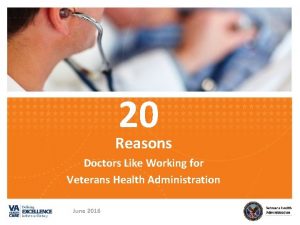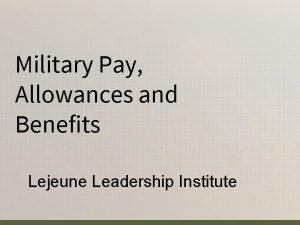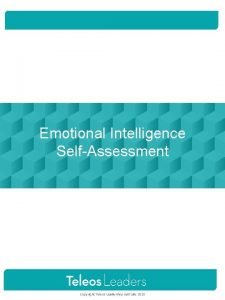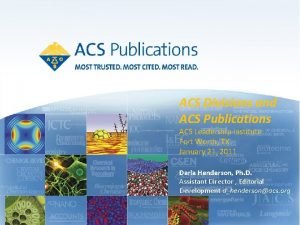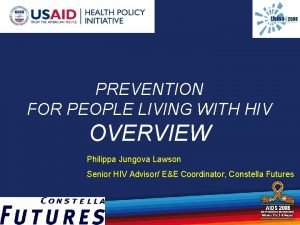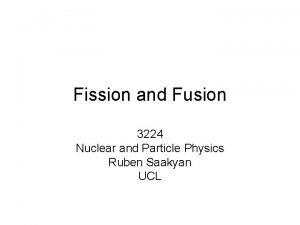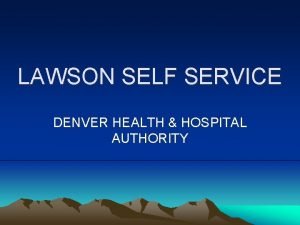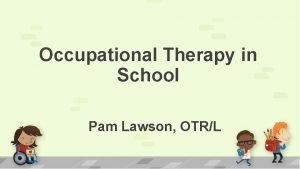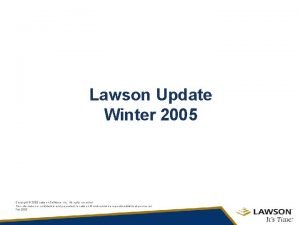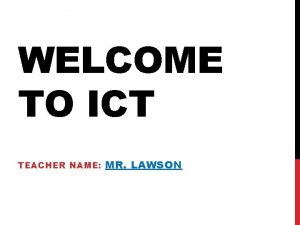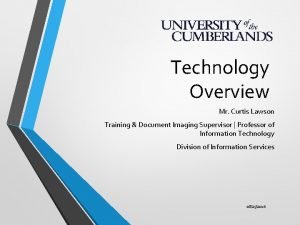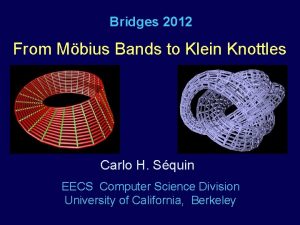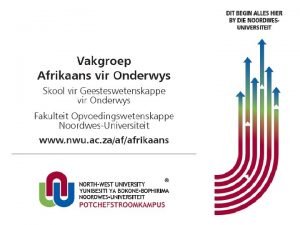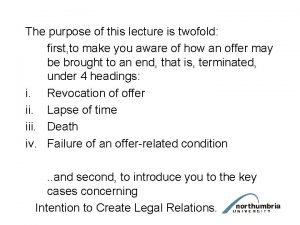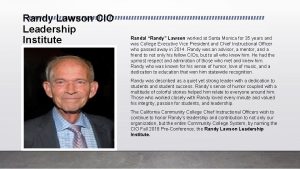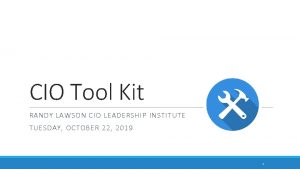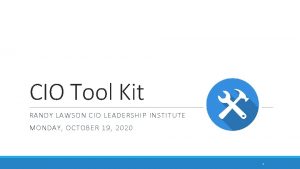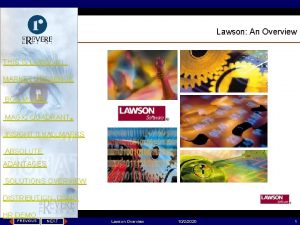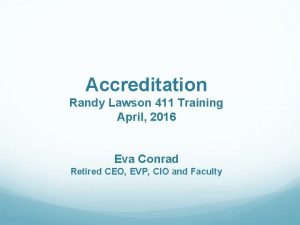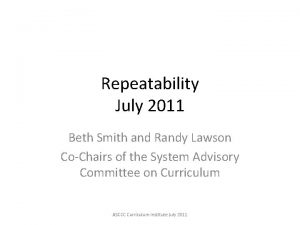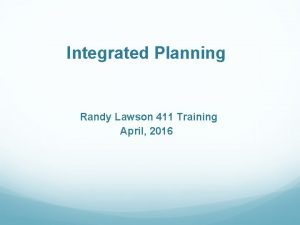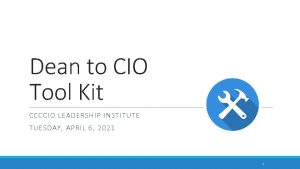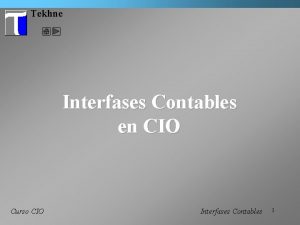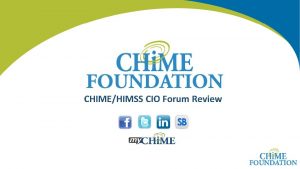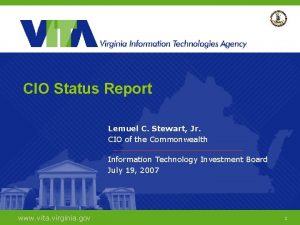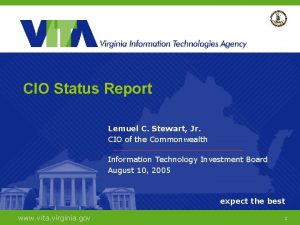Randy Lawson CIO Leadership Institute Randy Lawson CIO



























- Slides: 27

Randy Lawson CIO Leadership Institute

Randy Lawson CIO Leadership Institute Randal “Randy” Lawson worked at Santa Monica for 35 years and was College Executive Vice President and Chief Instructional Officer. Randy passed away in 2014. Randy was an advisor, a mentor, and a friend to not only his fellow CIOs, but to all who knew him. He had the upmost respect and admiration of those who met and knew him. Randy who was known for his sense of humor, love of music, and a dedication to education that won him statewide recognition. Randy was described as a quiet yet strong leader with a dedication to students and student success. Randy’s sense of humor coupled with a multitude of colorful stories helped him relate to everyone around him. Those who worked closely with Randy loved every minute and valued his integrity, passion for students, and leadership. The California Community College Chief Instructional Officers wish to continue to honor Randy’s leadership and contribution to not only our organization, but the entire Community College System, by naming the CIO Fall 2019 Pre-Conference, the Randy Lawson Leadership Institute.

What you don’t know, you don’t know. Laura Metune, Vice Chancellor, Governmental Relations Cheryl Aschenbach, Secretary, Academic Senate President California Community Colleges Leandra Martin, California Community Colleges Chief Instructional Officer, President

What is the Mission of the CIOs? Primary purpose: Provide a central a voice for academic matters in the state of California. Promote and advance teaching and learning in California Community Colleges Provide an instructional administrative perspective on community college issues in California To Participate with the Chancellor’s Office with the consultation process seeking and representing CIOs and liaison organizations To provide and sustain a communication among instructional administrations Promote communication and collaboration between other community college constituents including but not limited to the Academic Senate and CSSOs.

The Composition of the CIO organization • Regional Reps (10 regions) • Board – president, past- president, president-elect, vice-president (conference cochair), secretary, treasure, and 10 regional reps • Promote communication and collaboration including but not limited to Academic Senate (ASCCC), Chief Executive Officers (CEOCCC), Chief Student Services Officers (CSSO), Chief Business Officers (CEOCCC), Community College League of California (CCLC), California Community Association for Occupational Education (CCAOE), Council of Chief Librarians (CCL) and Association of Community and Continuing Education (ACCE) • CIOs – 115

CIO Committees and Representatives • • • Process: Chancellor’s Office Committees ASCCC Committees CIO Committees CCCAA Committees Others as needed

Communication and Collaboration • CEOs • CBOs • CSSOs • ACCCA • ASCCC • CCLC

Working with the Chancellor’s Office • CO staff • Consultation Council • Leadership Group Pre-Consultation Council meeting

Questions?

Academic Senate

Academic Senate for CCCs • The Academic Senate for California Community Colleges fosters the effective participation by community college faculty in all statewide and local academic and professional matters; develops, promotes, and acts upon policies responding to statewide concerns; and serves as the official voice of the faculty of California Community Colleges in academic and professional matters. The Academic Senate strengthens and supports the local senates of all California community colleges. • 501(c)(6) organization

Academic Senate for CCCs • Education Code § 70902 (B)(7)“ The Governing Board shall … ensure … the right of academic senates to assume primary responsibility for making recommendation in the areas of curriculum and academic standards. ” • TITLE 5 § 53203 • (A) Governing Board shall adopt policies delegating authority and responsibility to its Academic Senate. • (B) Policies in (A) shall be adopted through collegial consultation with the Academic Senate. • (C) Guarantees the Academic Senate the right to meet with or appear before the board.

Academic Senate for CCCs • The “ 10 + 1” Title 5 § 53200 (c) 1. Curriculum, including establishing prerequisites 2. Degree & Certificate Requirements 3. Grading Policies 4. Educational Program Development 5. Standards & Polices regarding Student Preparation and Success 6. College governance structures, as related to faculty roles 7. Faculty roles and involvement in accreditation process 8. Policies for faculty professional development activities 9. Processes for program review 10. Processes for institutional planning and budget development +1 Other academic and professional matters as mutually agreed upon

Academic Senate for CCCs • Executive Committee • 4 officers elected annually • 10 representatives elected bi-annually (staggered terms) • Executive Director • 15 standing committees + task forces and work groups • Grants: C-ID and OERi

Academic Senate for CCCs - Resources • Published Papers • https: //www. asccc. org/publications/academic-senate-papers • Rostrum Articles (quarterly) • https: //www. asccc. org/publications/rostrum • President’s Update • https: //www. asccc. org/president-update

Academic Senate for CCCs - Resources • Presentations • www. asccc. org -> Past Events -> Presentation Materials • Technical visits • Request ASCCC visit: https: //www. asccc. org/contact/request-services • Request Governance visit (with CCLC): https: //www. asccc. org/services/technicalassistance • Request Curriculum visit (with CCCCIOs): https: //www. asccc. org/curriculum-technicalassistance-visits • Ask questions: info@asccc. org

Questions?

Board of Governors The Board of Governors of the California Community Colleges shall provide leadership and direction in the continuing development of the California Community Colleges as an integral and effective element in the structure of public higher education in the state. The work of the board of governors shall at all times be directed to maintaining and continuing, to the maximum degree permissible, local authority and control in the administration of the California Community Colleges. - California Education Code 70901

Board of Governors • 17 -Members Appointed by Governor • 12 Public Members (confirmed by 2/3 Senate) • 2 current or former elected members of local districts • 2 Students (SSCCC recommendations) • Only 1 Student Votes • 2 Faculty (ASCCC recommendations) • 1 Classified Employee (Exclusive representative recommendations)

Chancellor’s Office • Chancellor Eloy Ortiz Oakley (Appointed by BOG) • 1 Deputy Chancellor • 1 Executive Vice Chancellor • 10 Vice Chancellors • 143 employees, 172 authorized positions

BOARD OF GOVERNORS GOVERNMENTAL RELATIONS Federal Relations State Relations COLLEGE FINANCE & FACILITIES PLANNING Facilities Planning Fiscal Services Fiscal Standards & Accountability Budgets WORKFORCE & DIGITAL FUTURES Workforce & Economic Development Digital Innovation & Infrastructure WORKFORCE & ECONOMIC DEVELOPMENT Grants and WIOA Strategic Projects Effective Practices Field Operations DIGITAL INNOVATION & INFRASTRUCTURE Management Information Systems Application Development Research & Data Analytics Strategic Projects CHANCELLOR COMMUNICATIONS AND MARKETING Communications Marketing Special Projects OFFICE OF THE GENERAL COUNSEL Contracts and Grants DEPUTY CHANCELLOR EDUCATIONAL SERVICES Academic Affairs Student Services & Special Programs ACADEMIC AFFAIRS Educational Programs Inter-segmental Programs Basic Skills Credit & Non-Credit Curriculum STUDENT SERVICES & SPECIAL PROGRAMS Veterans Services Student Success & Support Student Financial Aid DSPS & Health Services Foster & Kinship Care Student Senate Mental Health Cal. WORKs EOPS, CARE & CAFYES INSITITUTIONAL EFFECTIVENESS INTERNAL OPERATIONS Human Resources Labor Relations Business Services Accounting

Consultation Council • In March 1988, the Board of Governors adopted a process known as “consultation. ” Part of that process involves a council composed of representatives from selected community college institutional groups, labor unions, and students to assist in developing and recommending policy to the Chancellor and the Board of Governors. • The council meets regularly throughout the year. Council members review comments developed by other groups, locally-elected boards, and the California Legislature. • The formal consultation process allows the massive community college system to advise the Chancellor, who makes recommendations to the Board of Governors on matters of policy. • The purpose of the consultation process is to strengthen a system of communication, policy development, and review to ensure the quality and effectiveness of college operations and programs.

Membership of Consultation Council Institutional Representatives Chief Executive Officers of the California Community Colleges (2) Academic Senate (2) Student Senate (2) Association of Chief Business Officers (1) California Community Colleges Chief Student Services Administrators Association (1) Chief Instructional Officers of the California Community Colleges (1) Chief Human Resources Officer/Affirmative Action Officer (1) Organizational Representatives (1 Each) Association of California Community College Administrators California Student Association of Community Colleges Association/California Teachers Association California Community Colleges/California Federation of Teachers California Community Colleges Independents Community College League of California School Employees Association Faculty Association of California Community Colleges

Board of Governors Adopted Vision for Success Vision Goals 1. Increase credential obtainment by 20% 2. Increase transfer by 35% to UC and CSU 3. Decrease unit obtainment for a degree 4. Increase employment for CE students 5. Reduce and erase equity gaps 6. Reduce regional gaps Commitments 1. Focus on students’ goals 2. Design with the students’ experience in mind 3. High expectations and high support 4. Foster use of data and evidence 5. Own student performance 6. Thoughtful innovation and action 7. Cross-system partnership


The Work Ahead: 2020 -21 Budget and Legislative Request Foundational Resources • Base and Cola $328 M • PERS/STRS $100 M • Capital Outlay $650 M College Affordability • Financial Aid $250 M • Textbook Affordability $10 M • Survey of Basic Needs $350 M Faculty and Staff • Diversity Taskforce Recommendations $76. 5 M • Professional Development $15 M • Part-Time Faculty Support $10 M Student Services, Special Populations and Special Services • Student Equity and Achievement Program $20 M • Mental Health Services $10 M • Incarcerated Students $10 M 26

Questions?
 Randy lawson
Randy lawson Va healthcare leadership talent institute
Va healthcare leadership talent institute Lejeune leadership institute
Lejeune leadership institute Leadership institute texas state
Leadership institute texas state Teleos leadership
Teleos leadership Acs leadership institute
Acs leadership institute Adaptive leadership vs situational leadership
Adaptive leadership vs situational leadership Transformational leader and transactional leader
Transformational leader and transactional leader Adaptive leadership theory
Adaptive leadership theory Philippa lawson
Philippa lawson Max lawson oxfam
Max lawson oxfam Lawson criterion
Lawson criterion Woodward lawson method
Woodward lawson method Walmart capstone presentation
Walmart capstone presentation Denver health lawson
Denver health lawson Pam lawson
Pam lawson Lawson software training
Lawson software training William lawson md
William lawson md Welcome to ict
Welcome to ict Myuc cumberlands
Myuc cumberlands Lawson klein bottle
Lawson klein bottle Harriet tudmen
Harriet tudmen James russell odom
James russell odom Onderwereld eckardt as buitestander langvraag
Onderwereld eckardt as buitestander langvraag Invoice matching process
Invoice matching process Lawson kriterium
Lawson kriterium Leanna lawson
Leanna lawson Edmonds v lawson 2000
Edmonds v lawson 2000

